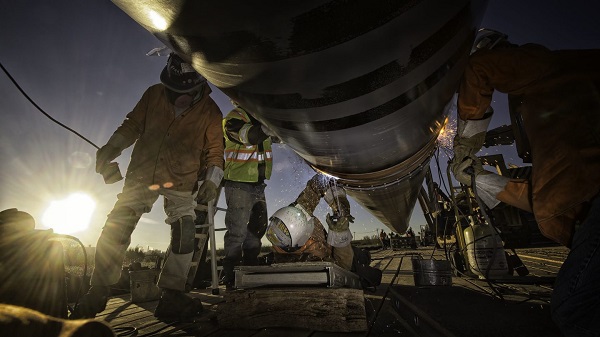Alberta
Sheriffs shut down Olds drug house

News release from the Province of Alberta
The Alberta Sheriffs have shut down a problem property where suspected drug activity threatened nearby playgrounds and other community spaces.
The Safer Communities and Neighbourhoods (SCAN) unit of the Alberta Sheriffs obtained a court order against the property owner of 5222 42 Street. The property will be closed for 90 days, beginning on Oct. 7 at noon. All individuals must vacate the premises, including the property owner.
The community safety order, obtained in the Court of King’s Bench, bars all people from the property until the closure period ends on Jan. 5, 2026, and prohibits certain individuals from accessing the property altogether, while the order is in place. The property will be boarded up, fenced and all the locks will be changed. SCAN members will continue to monitor the property for activity while their investigation remains ongoing. Community safety order conditions remain in effect until Jan. 5, 2028.
“SCAN now adds Olds to the long and growing list of Alberta communities that have benefited from its diligent investigative work. My thanks to members of the southern SCAN unit and the RCMP for the closure of another disruptive problem property that posed a risk to nearby playgrounds and the surrounding community and threatened public safety. Criminal activity has no home in our province. I encourage all Albertans to report suspicious activity where and when they see it.”
“Close collaboration with local police was essential for a successful investigation of this property and I thank the Olds RCMP for its partnership on this file. Residents are relieved to see this property close, putting an end to the illegal activities centred around it. Here and across Alberta, SCAN is dedicated to maintaining the peace and safety of neighbourhoods and communities.”
“Olds RCMP remains fully committed to building safer communities by working in partnership with our community as well as through investigative and enforcement efforts to achieve this goal. Olds RCMP would like to thank the Olds RCMP crime reduction member on conducting an excellent investigation and the Alberta Sheriffs SCAN unit for its assistance during this project.”
The Alberta Sheriffs work with other law enforcement agencies to shut down properties being used for illegal activities. The SCAN unit operates under the Safer Communities and Neighbourhoods Act, which uses legal sanctions and court orders to hold owners accountable for illegal activity happening on their property.
Since its inception in 2008, Alberta’s SCAN unit has investigated more than 10,000 properties and has issued more than 135 community safety orders. Most complaints are resolved by working with owners to stop the illegal activity on their property.
Quick facts
- Between February 2022 and May 2025, the RCMP attended the property 65 times for various types of calls for service.
- The RCMP executed three search warrants between January 2024 and April 2025, during which stolen property, illegal drugs and drug paraphernalia were recovered.
- SCAN investigators and the RCMP continued to receive complaints of suspected drug and criminal activities at the property throughout the course of their investigation and observed activity consistent with drug dealing.
Alberta
‘Visionary’ Yellowhead Pipeline poised to launch Alberta into the future

From the Canadian Energy Centre
Heartland leaders welcome proposed new natural gas connector
As a lifelong farmer, entrepreneur and community leader, Alanna Hnatiw knows first-hand the crucial role energy plays in a strong and diverse economy.
The mayor of Sturgeon County, a sprawling rural municipality northeast of Edmonton, Hnatiw has spent much of the last decade working to protect its agricultural roots while building new industries that support the jobs and services families and businesses rely on every day.
Hnatiw says there is widespread appreciation among the county’s 20,000 residents for the opportunities afforded by the province’s oil and gas resources. That’s why she joined other leaders in Alberta’s Industrial Heartland region to applaud a major new natural gas pipeline planned for the area.
“Natural gas is an integral to all the industrial operations in Sturgeon County and the surrounding area. It goes beyond just burning it to turn turbines, it is the feedstock for all kinds of value-added processing. From fertilizer and plastics to petrochemicals and hydrogen, natural gas is the lynchpin for us into the future,” she said.
Filling growing demand
Hnatiw is one of more than a dozen community and industry leaders who sent letters of support to the Alberta Utilities Commission (AUC) last year endorsing ATCO Energy Systems’ proposed Yellowhead Pipeline project.
The project achieved a significant milestone in August when the AUC approved ATCO’s application determining the pipeline is needed.
The largest infrastructure investment in the company’s history, the 230-kilometre pipeline from Peers to Fort Saskatchewan will transport more than 1.1 billion cubic feet of natural gas per day when operational in late 2027.
For context, Alberta produced about 11 billion cubic feet per day of natural gas in 2024, according to the Alberta Energy Regulator.
The Yellowhead Pipeline will boost deliveries to the greater Edmonton area as demand continues to grow for power generation, manufacturing, petrochemical processing and residential use.
Industrial customers have reserved 90 per cent of the pipeline’s capacity to meet their future needs.
This includes Dow Chemical, which plans to build an $8.9-billion net-zero ethylene processing facility in Fort Saskatchewan, Heidelberg Materials’ Edmonton facility that aims to be the world’s first full-scale cement plant equipped with carbon capture and storage (CCS), and McCain Foods, which requires more natural gas for a planned expansion of its French fry factory in Coaldale.
Prosperity driver
Edmonton Global CEO Malcolm Bruce described the Yellowhead Pipeline as a “visionary” infrastructure project in his letter of support to the AUC.
“The [project] will create jobs, enable billions in new investment and drive Alberta’s hydrogen roadmap and natural gas vision and strategy.”
ATCO’s projections show the pipeline will generate substantial economic benefits. The company estimates that during construction, it will support 12,000 jobs and contribute $1.6 billion per year to Alberta’s economy.
Once in operation, the pipeline is expected to support 23,700 jobs per year and add $3.9 billion annually to Alberta’s GDP.
For Sturgeon County, the project also provides much-needed certainty that natural gas will be available for the $30 billion in new industrial investments the region is hoping to attract in the coming years.
Future plans
The municipality is already home to major operations including the NWR Sturgeon Refinery and Nutrien fertilizer plant, both of which capture carbon dioxide emissions that are transported through the Alberta Carbon Trunk Line for deep underground storage near Clive, Alberta.
Hnatiw said future development may include hydrogen production with CCS, petrochemical processing, gas-fired power plants and large-scale data centres.
“With our operations running near capacity right now, this new pipeline helps alleviate the uncertainty around gas supplies for industrial developers,” Hnatiw said.
The county’s industrial goals are inextricably tied to ensuring its farming sector continues to flourish, she said.
“Eighty per cent of our land base is agricultural, but it only accounts for one per cent of our budget as far as taxes go, so we need our industrial residents to support our rural way of life,” she said.
“We don’t want people to have to leave our community to make a living. We want a future that is full of opportunity, and one that is also sustainable for the families that produce our food, our fuel, and all the other value-added products we can provide.”
ATCO’s next step is to file for AUC approval to build the pipeline later this year. The company expects construction to begin in 2026.
Alberta
Jason Kenney’s Separatist Panic Misses the Point

By Collin May
Time was a former political leader’s expected role was to enjoy retirement in relative obscurity, resisting the urge to wade into political debate. Conservatives generally stick to that tradition. Ralph Klein certainly did after his term ended. Stephen Harper has made no attempt to upstage his successors. Yet former Alberta Premier Jason Kenney can’t seem to help himself.
From the boardroom of Bennett Jones, one of Calgary’s oldest law firms, Kenney recently offered his thoughts on the unspeakable horrors that await the province should it entertain a debate (perhaps even call a referendum) on separating from Canada. While dismissing Alberta separatists as a “perennially angry minority”, Kenney nevertheless declared a vote on separation would “would divide families, divide communities, divide friends for no useful purpose.” Business partnerships, church and community groups, even marriages and families would break apart, he warned, “shredding the social fabric of the province.”
It was a remarkable burst of untethered hyperbole, but it says more about the former premier than it does about the province he once led.
Kenney’s take on the history of Alberta separatism is telling. It’s a 50-year-old “discredited concept,” he said, whose acolytes “couldn’t get elected dogcatcher in this province.” Exhibit A in his analysis was Gordon Kesler, an Alberta rodeo rider and oil company scout who believed independence was the only way to save Alberta from Ottawa’s depredations. In a 1982 byelection, Kesler got himself very much elected as an MLA under the Western Canada Concept banner. He later lost in the general election to Peter Lougheed’s Progressive Conservatives, but Lougheed did not belittle Albertans for entertaining separatist notions. Instead, he asked for a mandate to fight Ottawa more effectively — and got it.
Kenney, by contrast, ridicules separatists while simultaneously painting them as an existential menace. Worse, he likens them to followers of Vladimir Putin and (perhaps even worse?) Donald Trump. “[I]f you just follow them on social media,” he claimed, one will quickly see that they cheered on Putin’s attack on Ukraine and Trump’s threat of making Canada the 51 st state.
Kenney’s latest intervention fits a pattern. As premier from 2019 to 2022, he could not resist trying to stamp out dissent. During the pandemic, he alienated political allies by dismissing their concerns about mandatory vaccines with contempt. He saw his ouster as UCP leader as the result of a Trumpian-inspired or “MAGA” campaign. UCP party faithful, however, said their rejection of him had far more to do with his top-down leadership style and habit of “blaming other people for the errors he made.”
What’s especially striking about Kenney’s separatist obsession is that he seems to understand as little about Albertans now as he did while premier. Albertans have long debated separation without the province descending into chaos. When Kesler won his seat, people talked about separation, argued its pros and cons, but couples were not running to their divorce lawyers over the issue and business partners were not at each other’s throats.
And there are legitimate reasons for concern about Canada’s social and political structure, as well as the role provinces play in that structure. Canada’s institutions operate largely on an old colonial model that concentrates power in the original population centre of southern Ontario and Quebec. This has not, and does not, make for great national cohesion or political participation. Instead, it feeds constant fuel to separatist fires.
The current threat to Canadian identity comes as well from the ideological commitments of our federal government. Early in his time as Prime Minister, Justin Trudeau declared Canada to be a “post-national” state. This sort of moniker is consistent with the popularly-designated woke doctrine that eschews the liberal nation-state, democratic procedures and individual freedom in favour of tribalist narratives and identity politics.
The obsession with post-nation-state policies has initiated the dissolution of the Canadian nation regardless of whether Quebeckers or Albertans actually vote for separation. We are all becoming de facto separatists within a dissolving Canada, a drift that current Prime Minister Mark Carney’s ineffective “elbows up” attitude has done nothing to reverse.
Kenney’s panicked musings about Alberta separatists would have us believe the province need only continue the fight for a better deal within the Canadian federation. Kenney pursued just such a policy, and failed signally to deliver. For too many Albertans today, his advice does not reflect the political reality on the ground nor appreciate the worrying trends within Canadian institutions and among our political class.
Kenney likes to associate himself with Edmund Burke, the father of conservatism and defender of venerable institutions. But Burke was known as much in his day for his sympathies with the American revolutionaries and their creation of an experimental new republic as he was for his contempt towards the French Revolution and its Reign of Terror. Burke’s conservatism still linked real actions with true words. It would be advisable, perhaps, to keep our own political language here in Alberta within the bounds of the plausible rather than fly off into the fanciful.
The original, full-length version of this article was recently published in C2C Journal.
Collin May is a lawyer, adjunct lecturer in community health sciences with the Cumming School of Medicine at the University of Calgary, and the author of a number of articles and reviews on the psychology, social theory and philosophy of cancel culture.
-

 Opinion2 days ago
Opinion2 days agoJordan Peterson needs prayers as he battles serious health issues, daughter Mikhaila says
-

 COVID-191 day ago
COVID-191 day agoFreedom Convoy Sentencing: Lich and Barber escape prison terms but will spend months in house arrest
-

 Alberta1 day ago
Alberta1 day ago‘Visionary’ Yellowhead Pipeline poised to launch Alberta into the future
-

 COVID-1915 hours ago
COVID-1915 hours agoDevastating COVID-19 Vaccine Side Effect Confirmed by New Data: Study
-

 Immigration2 days ago
Immigration2 days agoConservatives blame Liberals for allowing man on UK child sex offender list to enter Canada
-

 espionage2 days ago
espionage2 days agoCanada’s federal election in April saw ‘small scale’ foreign meddling: gov’t watchdog
-

 Crime1 day ago
Crime1 day agoThe Bureau Exclusive: Chinese–Mexican Syndicate Shipping Methods Exposed — Vancouver as a Global Meth Hub
-

 Crime1 day ago
Crime1 day agoCanadian Sovereignty at Stake: Stunning Testimony at Security Hearing in Ottawa from Sam Cooper








